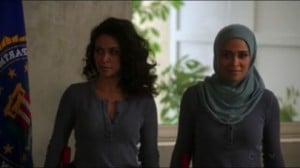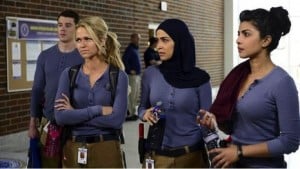The third season of Little Mosque on the Prairie has just started up, so I figured it was time to have a discussion about it. Actually, I’ll be honest and admit that really, the reason I’m talking about it is that I wrote a paper on it for a class on popular culture last week, and figured I’d multi-task by tweaking the paper to post on MMW as well. But still. Although Little Mosque has been discussed on MMW a few times already, there’s always lots to say..

As a white Muslim woman who doesn’t wear hijab, I’ve always paid particular attention to the character of Sarah, played by Sheila McCarthy. In fact, for a really long time, she was the only representation (real or fictional) that I had ever encountered of a Muslim woman who shared my ethnic background and didn’t wear a headscarf. It’s hard to explain why this was so significant, but in our society where Muslims are so often illustrated as necessarily the “other,” it feels sometimes like we’re told that you’re either Muslim or you’re white, and those images can get confusing for someone who fits completely into both categories. Since I don’t wear a scarf, and have an English-sounding name, I’m always seen as white (and therefore generally assumed not to be Muslim, which can lead to weird situations.) I was excited to see that Little Mosque had a character who was similarly located in terms of identity.
Although there are a lot of problems (which I will get into in a second), I do have to say that I really appreciate that Sarah’s character is there. She is clear about the fact that she is Muslim, and makes a point of mentioning her Muslim identity in several of the shows, even when she is not following traditional Islamic practices. This may allow the audience to understand the definition of a Muslim in ways that they may not have previously considered: she doesn’t “look” like (their impression of) a Muslim, she doesn’t “act” like a Muslim, so what is it that makes her a Muslim? Sarah’s mere presence on the show has the potential to demonstrate that “Muslim” is, for many people, first and foremost a personal spiritual affiliation, and not an identity that has to be read from the outside. Given that the category of “Muslim” seems to be increasingly racialised as always a foreign identity in the media, political discourses, and elsewhere, alternate images are hugely important.
There is a (not entirely unfounded) stereotype among Muslims that those who have newly embraced Islam tend to immediately take on many of the most conservative understandings of Islamic practice, and distance themselves in many ways (changing their name, adopting new clothing, and so on) from the cultures in which they were raised. I appreciate that Sarah’s character diverges from this image. The construction of her character affirms that people who become Muslim don’t automatically have to become model followers of the faith, and that it is possible to be Muslim without this being the main defining feature of someone’s life. Sarah manages to become Muslim without the rest of her life changing in massive ways, which may convey that Islam is not as incompatible with Western society as some people assume it to be. Sarah’s presence on the show is an important tool of disrupting notions of who gets identified as “Muslim” and of what that identification actually means.
On the other hand, I worry that certain aspects of Sarah’s character may actually bolster some negative and even harmful images of the relationship between Muslims and white non-Muslims in Canada. Sarah rarely says anything positive about Islam; she self-identifies as a “bad Muslim” (which is a whole other discussion in itself), complains about the Islamic lunar calendar (proposing they change the month of fasting to December rather than Ramadan, because days are always short and shopping is good), whines about missing Christmas, and scoffs at various other Islamic traditions. Although Sarah’s identity as a Muslim might challenge viewers’ impressions of who Muslims are, her dismissal of so many of Islam’s beliefs and practices may confirm for the non-Muslim audiences of the show that such concepts are still foreign, archaic, or just plain weird. The value of having a Muslim character who shares the ethno-cultural background of mainstream Canadian viewers is negated to some degree by the fact that this character allows such viewers to remain relatively comfortable in their suspicion of Islam.
Sarah also demonstrates that she knows very little about Islam, even the basics. She defines herself repeatedly as a “bad Muslim,” and lacks elementary knowledge on practices such as the ritual prayer, despite presumably having been Muslim for at least a couple decades. In the episode entitled “The Convert,” Sarah makes a bet with her daughter that she will be able to pray five times a day for an entire month. It only takes a short while for this effort to make her exhausted and disoriented, with no time for her work. On a personal level, I am annoyed that the one popular culture representation of a Muslim who looks like me is so flaky; on a broader level, I am concerned about what message this sends about Islam’s requirements. Praying five times a day is one of the most basic pillars of Islam, and is followed by millions of people around the world, most of whom still manage to function just fine in the other aspects of their lives. While Sarah’s inability to cope with this practice can certainly be taken as simply indicative of personal flaws in her own character, I do worry that it could also convey a message that following Islam is an unrealistic burden that just doesn’t fit within a Western lifestyle. (At no point does the show demonstrate to us that other characters likely do pray five times daily, and unlike Sarah, manage to go normally about their lives.) I also worry that the fact that this “bad Muslim” doesn’t wear hijab implies that all the rest of us non-hijab-wearing Muslim women also don’t pray regularly (or know how to do so), or don’t know much about the religion, when of course there is a wide range of knowledge and practice both among those who don’t wear hijab and among those who do.
Another thing that bugs me about Sarah’s character is the way that she may reinforce the common stereotype of (most) Muslim women being oppressed. For example, during the “Barrier” episode in the first season (see the clip above, starting around 5:30), a group of white women from the town come to the mosque to protest plans to build a barrier between the men’s and women’s sections of the prayer space. As they chant, “Oppressed Muslim women of the world, cut your chains and be free!” Sarah says that she will handle the situation. She approaches the women and whispers that she completely agrees with them, then proceeds to loudly berate them about how they are infringing on the rights of Muslim women to make their own decisions about how they would prefer to pray. She points to Fatima, a woman who actually wants the barrier, and criticises the protesters for making assumptions about the needs of women of colour. As the leader stammers an apology, Sarah whispers to her that she appreciates that they came, and that she will call them if she needs their help.
While Sarah’s louder comments were actually quite poignant (and much more consistent with my own position on what those protesters needed to be told), she undermines them with her secret identification with the protesters, implying that Muslim women do in fact need white non-Muslim outsiders to save them, and legitimising the kinds of imperialist feminisms in which many white non-Muslim western women engage. Her whispered contradictions of her more loudly-stated points also suggest that Fatima should not, in fact, be trusted to make her own decisions, and that it is indeed entirely appropriate to make decisions on behalf of marginalised women. Sarah’s own whiteness allows her to maintain her own voice and agency within this discussion, without challenging common conceptions of most Muslim women as oppressed victims in need of saving. I’m concerned that scenes such as this one, and others where Sarah voices her disagreement with other facets of Islam, may actually allow the audience to hold on to their personal prejudices about Muslims, and may even lend validity to these perceptions.
So I’m a bit torn on how I feel about this (and about other aspects of the show, but I’ll stop at Sarah for now.) Does Sarah’s character challenge the idea of “Muslim” as a foreign identity, belonging only to those who look “different” or come from “over there”? Or does she reinforce ideas of Islam and its practices as strange and often oppressive, with its traditional practices being largely incompatible with mainstream Canadian culture? My own impression is that she does both, and while I still appreciate her presence in the show, I am not convinced that this presence is always a positive force. I do keep watching though, largely out of sheer curiosity, but also out of hope that its effects on Canadian (and global) viewers will ultimately be more beneficial than harmful.











